Monday, May 21, 2012
1987 West German National Team Udo Kiessling Jersey
Born on this day in 1955, one of the finest players in German hockey history, Udo Kiessling was a rugged defenseman who began his career with SC Riessersee in the 1972-73 season. He also made his international debut with West Germany at the 1973 World Championships where he appeared in 10 games. Unfortunately, the Germans were outclassed by the competition and were relegated to Group B.
Kiessling moved to Augsburger EV for the 1973-74 season where he began to find his offensive game, doubling his goal total from the previous season to 16 in 36 games. He would again appear in the World Championships for West Germany.
The rise in the offensive side of his game continued in 1974-75 for SB Rosenheim with 20 goals and 38 points in 34 games. That year's World Championship Group B saw West Germany finish tied atop the standings with East Germany, both with a 6-1 record. However, for 1976 the top level would expand from 6 teams to 8, offering up two promotion spots, meaning no tiebreakers would be needed as both nations were elevated to Group A.
Kiessling's father Gerhard Kiessling was actually at one point the East German National Team coach, but thefamily to snuck into West Germany when Udo was young, and Gerhard later coached the West German National Team from 1966 to 1973, just as Udo's international career was beginning.
A second season with Rosenheim saw Keissling excel with 30 goals and 52 points in 34 games. During the season he also made his Olympic debut, where West Germany needed to advance out of the First Round, where they defeated Switzerland 5-1 to move into the Final Round of play. There, they defeated Poland 7-4 before losing to Finland 5-3, the Soviet Union 7-3 and Czechoslovakia 7-4.
On the final day of play, the Finns defeated Poland, setting up the final game between the United States and West Germany. If the Germans could defeat the United States, it would leave Finland, the United States and Germany each with a 2-3 record and 1-1 amongst themselves, making goal differential in their games as the deciding factor for the bronze medal. With West Germany ahead 3-1, they had accomplished their first goal of winning the game, but needed one final goal to drop the United States to even in goals and surpass the Finns, who were at +1. That goal did arrive thanks to Ernst Koepf , giving West Germany their first medal in any international competition since 1953 and equalling their Olympic bronze won back in 1932 - when the tournament consisted of just four teams.
Kiessling later competed the World Championships, were West Germany avoided relegation with a 6th place finish, ahead of both Finland and East Germany.
Kiessling in 1976 against the Soviet Union's Vitali Petrov
1976-77 saw him move to another new club, the Kölner Haie (Cologne Sharks). For the next three seasons he would play for Cologne, scoring 34 points in 1977 and 1978 before setting a new career high with 60 points in 40 games from 28 goals and 32 assists in 1978-79 and having been named the German Player of the Year in 1977. Additionally, his international resume continued to grow, as he made his customary appearance at the World Championships each year, with West Germany defending it's place in the top division each time.
The 1979-80 season broke the pattern, as Kiessling moved to Dusselforfer EG, where he impressed his new bosses with a career best 39 goals, 44 assists and 83 points, coming in only 48 games. Kiessling was also a member of the West German 1980 Olympic hockey team, scoring 2 goals and 4 points in 5 games.
He would remain with Dusseldorf for two additional seasons, 1980-81 and 1981-82. Once Dusseldorf was eliminated from the postseason, Kiessling came to North America on a tryout contract with the Minnesota North Stars, enticed by Lou Nanne, who was impressed with Kiessling's play back in the 1977 World Championships. He saw action in one game with Minnesota, who want to sign him to a contract, but Kiessling declined because he wanted to play for West Germany in the World Championships, ending his all-to-brief flirtation with the NHL after becoming the first German to ever play in the NHL.
His 1982-83 season began with EV Fussen in the second division, but after 21 games, Kiessling made a move to rejoin the Cologne Sharks, with whom he would remain for the next ten seasons, with his best coming in 1985-86 when he scored 18 goals and 45 points, a total he nearly equalled the following season with 44. He would also win his second Player of the Year award in 1984, a season which also saw him participate in his third Olympics.
Kiessling (right) with Hardy Nilsson (center) and Helmut Steger after winning the German championship in 1987
From 1983 to 1990, Kiessling would compete in the World Championships every year, with a best finish being a fifth place in 1983, which equalled his career best in 1978. He also competed in the 1984 Canada Cup, the only time West Germany would participate in the Canada Cup tournament. 1986 saw his third German Player of the Year award while 1988 saw him skate for West Germany once more in the Olympics, his fourth, where he set a personal Olympic best with 6 points.
Kiessling battling with Canada's Steve Tambellini in 1988
East and West Germany were reunited in December of 1989, and following Cologne's regular season in 1990-91, Kiessling made his 15th World Championship appearance, but his only one for the reunited Germany at the Worlds. During that tournament, he would play with Koepf's 23-year-old son, Ernst Jr. "I saw 'Koepf' on the back of the jersey and tried to make myself play like I was 21 again, but I couldn't," Kiessling joked.
Kiessling had one final international participation remaining in his career, that coming in his then record setting fifth Olympics in 1992, again, his only one for the reunified Germany.
Kiessling in Albertville, France in his record setting fifth Olympics
His German domestic career would conclude with four seasons with EV Landshut from 1992-93 to 1995-96, the final one coming as Kiessling was now 40 years old and only ending at that point due to a severe injury due to taking a puck to the face which broke 15 fractures and a month in the hospital.
Kiessling with his final club, the unusually named Landshut Cannibals
His final career totals are 1,065 games played with 334 goals and 520 assists for 854 points. He would also amass 1,561 penalty minutes and was a 15 time German league all-star and three-time German Player of the Year, winning four Defenseman of the Year awards and six national titles, with those coming in 1977, 1979, 1984, 1986, 1987 and 1988. His 320 international appearance is still the all-time record for Germany and was the best ever at the time of his retirement, still ranking second on the all-time list.
Following his career, he was named the Best German Defenseman of all time and inducted into the German Hockey Hall of Fame as well as the IIHF Hall of Fame in 2000.
Today's featured jersey is a 1987 West German National Team Udo Kiessling jersey. This style was worn by West Germany during the final year of Adidas supplying jerseys for the World Championships and was Kiessling's 12th World Championships, during which he set personal bests with 5 goals and 8 points as West Germany finished 5th, including wins over Finland, Canada and Switzerland.
Bonus jersey: Today's bonus jersey is a 1994-95 Landshut Cannibals Udo Kiessling jersey. This utterly bizarre jersey is quite unlike any we have featured previously on Third String Goalie, with it's repeating, wild cartoon character logo and minimalist design. One can only imagine what names they passed on before choosing "Cannibals" and the response was from Fujitsu upon seeing their logo on this jersey for the first time!
Of note, the character "ß" in Kiessling's name on this jersey in German is pronounced as "sz" and written as either SZ or SS despite it's similarity in appearance to an English capital B.
Perhaps this was a case of "there is no such thing as bad publicity" in action. Either way, once you've seen a Landshut Cannibals jersey, you won't soon forget it.
Extra bonus jersey: Today's extra bonus jersey is a 1992 West Germany Udo Kiessling jersey as worn in the 1992 World Championships, differentiated from the Olympic jerseys by the sponsorship patches on the arms.
This jersey is a prime example of the graphic design excesses of the early 1990's, with it's wild diagonal striping and torn paper edges. Note how busy the lower half of the jersey is and just how spartan the upper half is, with only it's discreet German Hockey Federation logo adding any sort of design element to the standard Tackla template of contrasting shoulders and chest logo shared by all teams. Show someone separate photos of the top and bottom half, and we doubt anyone would ever guess they were from the same jersey!
In today's video section, a look at some historical footage of Kölner Haie, which shows Kiessling scoring one of his many goals from the blueline.
Labels:
Germany,
IIHF,
Keissling Udo
Subscribe to:
Post Comments (Atom)

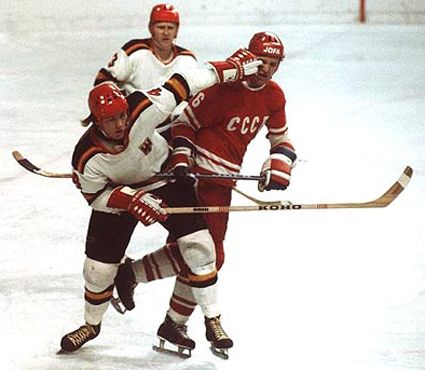
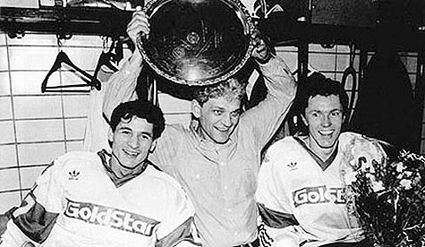
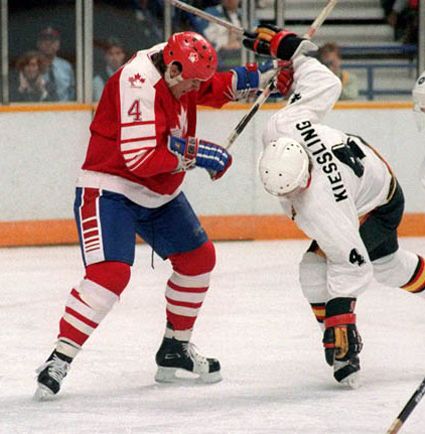
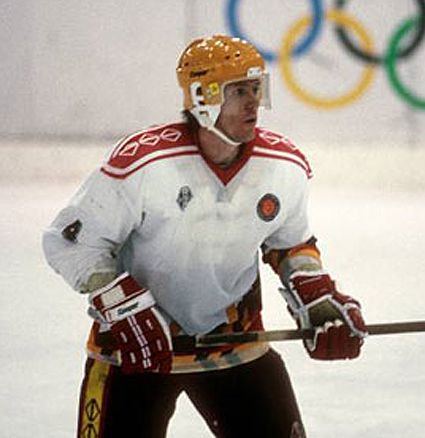
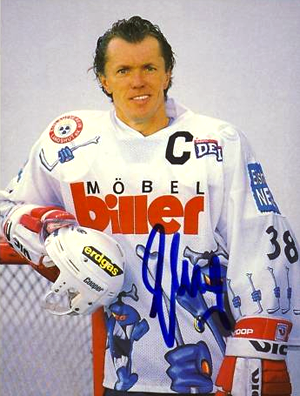
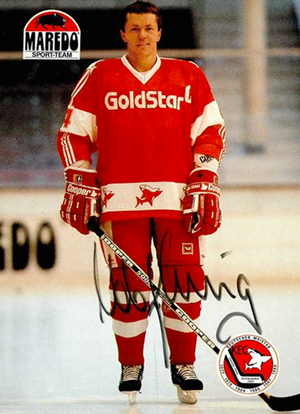
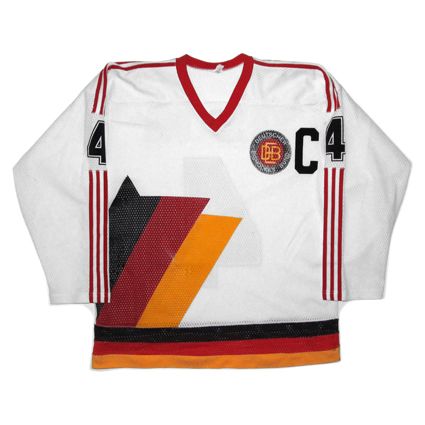
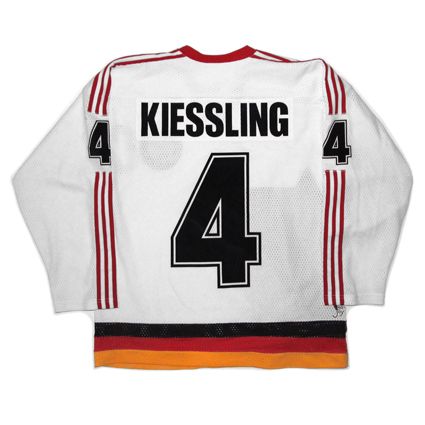
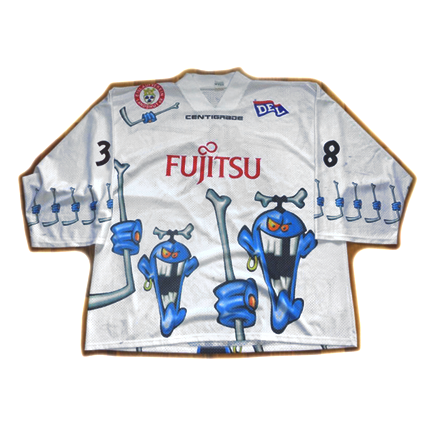
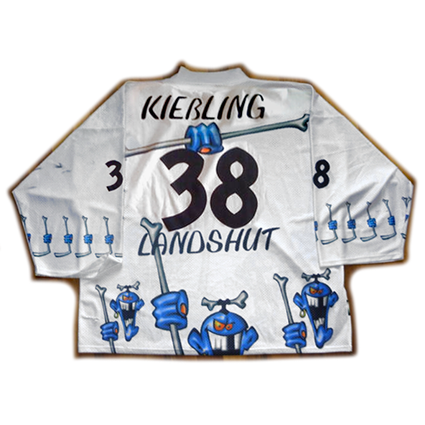
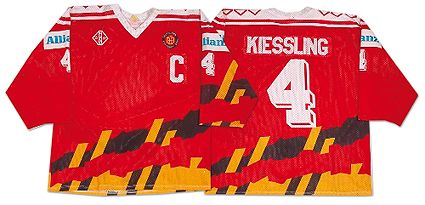










No comments:
Post a Comment
We welcome and encourage genuine comments and corrections from our readers. Please no spam. It will not be approved and never seen.